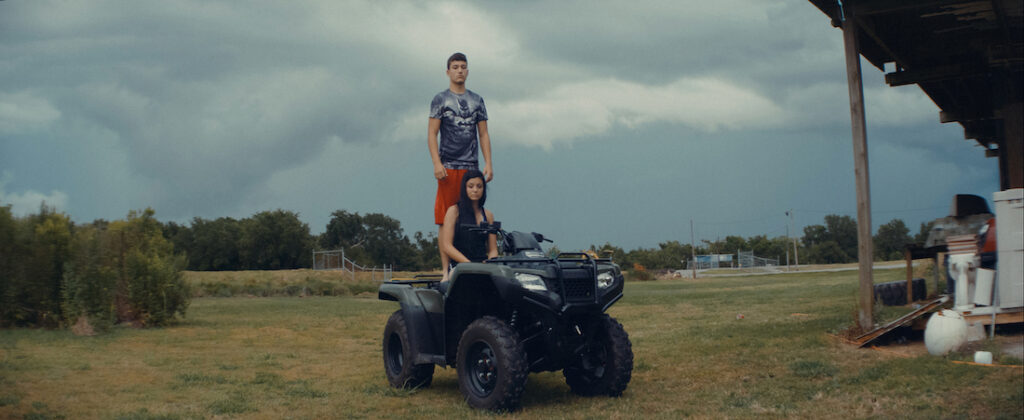Much has been written regarding the positive environmental effects COVID-19 has had as fewer people make long-term travels or daily commutes in their cars. Make no mistake, though, the damage has been done and cannot be repaired just because many of us are sitting out a road trip. As the documentary, “Lowland Kids,” points out, there’s now no such thing as a climate refugee. Who are climate refugees? In the case of the residents Sandra Winther’s documentary “Lowland Kids,” they live on an island off the coast of Louisiana called Isle de Jean Charles.
If you were thinking something along the lines of “Beasts of the Southern Wild” when you read that, it’s not quite that, but it is home to a very small and diverse Native American population. The film centers on two teenagers who live with their wheelchair-bound uncle. Like many inhabitants, their house is built on stilts as a precautionary measure against common flooding. This family, as well as their close friends and loved ones, who also fill the narrative, face a difficult future as they have to pack up their belongings and find a new home as part of a governmental project that helps relocate people who live where there will soon be no inhabitable land.
Winther keeps the focus primarily on the personalities here, giving the viewer a strong sense of a larger neighborhood existing among the small group of people. The brother and sister, Howard and Juliette, come off as incredibly likable and sympathetic. They lost their parents, but are adapting to the loss as they live under the care of their good-natured uncle Chris. Now, they are about to lose their home. Winther stops the story around there, which makes her film more about the feeling of home than about the direct realities of losing it.
Winther’s doc consists of stunning magic-hour shots that revel in the details of a lived-in, remote landscape as well as the stunning vistas. Sadly, those sunsets represent something else entirely when it comes to the future for the people of this island. Drone shots might be par for the course with all documentaries nowadays, but the ones in Winther’s film will resonate as we see an entire neighborhood gasping for one last breath of Louisiana air.
“Lowland Kids” is a beautiful film that keeps the obvious details about climate change and erosion to a minimum, in order to put a human face on its message. These teenagers are old enough to be cynical, but wise enough to know how deeply the experience of losing a home will affect them.

Q&A with director Sandra Winther
How did this come about?
My friend and producer William Crouse had come across articles related to the resettlement of Isle de Jean Charles and we both felt there was an important story to tell. A story about loss, of saying goodbye to something so intrinsic to your sense of identity. This was the frontline of climate change in America.
We planned a visit to the island, but as the date moved closer it didn’t feel right to go down there without a crew. When DP Todd Martin signed onto the project, it marked the beginning of a transformative experience. We had a lot of faith in the story and each other. We didn’t overthink it. And looking back it was perfect how organic it was. You can do a lot with just an open mind, an open heart and a camera.
There are a few threads going throughout the film. Can you tell me about how you saw it coming together during the process of filming it?
The process of filming was very fluid and reactive. We immersed ourselves in their world and became part of their tight-knit family for a while. We observed, learned, and I asked a lot of questions. With every interview, something new would come to light and I would have ideas of scenes we could pair those themes and sound bites with. There were specific points I wanted to hit and I always had a loose structure in mind, but it was very much a process of just letting their lives unfold and being there to capture it. Afterwards, editor Laura Tomaselli and I were able to craft a story that gradually peeled back the layers to reveal the subjects’ experiences.
There are many ways this could have turned into an angry political movie, but instead it feels more personal and contemplative. Did that have to do with the people you chose to focus on?
It was a conscious choice to not make a traditional climate change documentary and that’s maybe because I’m more drawn to individuals, to characters, to intimacy and closeness than anything else. That’s my way of speaking about these macro issues. I always knew I wanted to show the youth’s perspective –it was an angle that I hadn’t seen in any of the news coverage and one I was very curious about– and as we got to the island, I was instantly drawn to Howard and Juliette. Getting to know them and their uncle, a story emerged that had real soul. The kind you could feel in the air as you sat on their porch and the sky turned bright orange as the sun set over the bayou behind their backyard… The sounds of Chris’ rocking chair and Howard and Juliette playing football. It was with them that the film found its heart. And I felt that was where I should stay. Right there on that porch.

What were some of the challenges (if any) of filming in such a remote part of the country?
Every production has its challenges, but a big concern for me personally was how we’d release it, how we’d get it out there. While my producers, William Crouse and Lauren Avinoam were confident, I was kind of terrified. Everyone believed deeply in the project, but where would this film live? Would anyone even see it? I hoped they would and that we could make a small difference and inspire action, that it would resonate. But you never know right?
All I can say is that I’ve been blown away by the reception, at festivals and outside of them. I’m happy the magic translated in some way, that the Brunets are being seen and that audiences are feeling what they’re feeling, even just for a short moment. Even a year and a half later, new people are seeing the film every day. That makes me smile.
Have you kept in touch with this family? Have they relocated permanently?
We keep in touch and I hope it stays that way forever. Juliette and Howard are savvy on text and Facetime and Chris calls us whenever there’s an update. They’ve just signed up for a home on the relocation site in Schriever, a decision which was very difficult for Chris to make. Construction began last month and they’re expecting all homes to be ready by 2022.
What’s next for you?
I’m working on a few narrative projects at the moment and trying to take everything I’ve learned in the doc world and applying it to the world of fiction. I just finished a feature script for a movie that revolves around Hurricane Maria and I’m excited for the journey to getting it made. We’re also discussing following the Brunets’ journey over the next two years. The most important to me is remaining focused on stories that carry political and cultural value and that shine a light on the experience of minorities and young people. These are the areas where I feel I can make a contribution –one that hopefully helps inspire understanding, empathy and change.












